A doxology is a short hymn of praises to God in various forms of Christian worship, often added to the end of canticles, psalms, and hymns. The tradition derives from a similar practice in the Jewish synagogue, where some version of the Kaddish serves to terminate each section of the service.

A hymnal or hymnary is a collection of hymns, usually in the form of a book, called a hymnbook. They are used in congregational singing. A hymnal may contain only hymn texts ; written melodies are extra, and more recently harmony parts have also been provided.

"Love Divine, All Loves Excelling" is a Christian hymn by Charles Wesley on Christian perfection. Judging by general repute, it is among Wesley's finest: "justly famous and beloved, better known than almost any other hymn of Charles Wesley." Judging by its distribution, it is also among his most successful: by the end of the 19th century, it is found in 15 of the 17 hymn books consulted by the authors of Lyric Studies. On a larger scale, it is found almost universally in general collections of the past century, including not only Methodist and Anglican hymn books and commercial and ecumenical collections, but also hymnals published by Reformed, Presbyterian, Baptist, Brethren, Seventh-day Adventist, Lutheran, Congregationalist, Pentecostal, and Roman Catholic traditions, among others including the Churches of Christ. Specifically, it appears in 1,328 of the North American hymnals indexed by the online Dictionary of North American Hymnology, comparable to Newton's "Amazing Grace" (1,036), Wesley's "O for a Thousand Tongues" (1,249), and Watts' "When I Survey the Wondrous Cross" (1,483), though still well short of Toplady's "Rock of Ages" (2,139) or Wesley's own "Jesu, Lover of my Soul" (2,164).

"O for a Thousand Tongues to Sing" is a Christian hymn written by Charles Wesley. The hymn was placed first in John Wesley's A Collection of Hymns for the People Called Methodists published in 1780. It was the first hymn in every (Wesleyan) Methodist hymnal from that time until the publication of Hymns and Psalms in 1983.

Frances Ridley Havergal was an English religious poet and hymnwriter. Take My Life and Let it Be and Thy Life for Me are two of her best known hymns. She also wrote hymn melodies, religious tracts, and works for children. She did not occupy, and did not claim for herself, a prominent place as a poet, but she carved out a niche for herself.
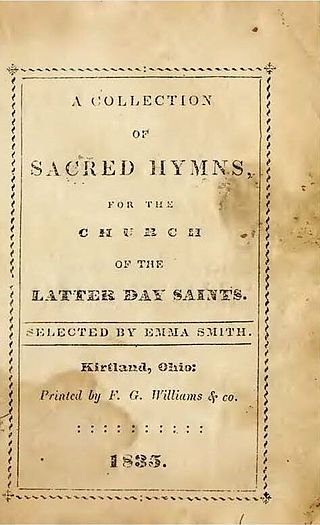
A Collection of Sacred Hymns, for the Church of the Latter Day Saints. was the first hymnal of the Latter Day Saint movement. It was published in 1835 by the Church of the Latter Day Saints.
Anne Steele was an English Baptist hymnwriter and essayist. For a full century after her death, she filled a larger place in United States and British hymnals than any other woman.
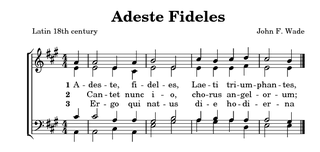
A hymn tune is the melody of a musical composition to which a hymn text is sung. Musically speaking, a hymn is generally understood to have four-part harmony, a fast harmonic rhythm, with or without refrain or chorus.

"Wachet auf, ruft uns die Stimme" is a Lutheran hymn written in German by Philipp Nicolai, first published in 1599 together with "Wie schön leuchtet der Morgenstern". It appears in German hymnals and in several English hymnals in translations such as "Wake, Awake, for Night Is Flying", "Wake, O wake! with tidings thrilling", and "Up! Awake! From Highest Steeple". Johann Sebastian Bach based a chorale cantata on the hymn, Wachet auf, ruft uns die Stimme, BWV 140, one of its many musical settings.

O filii et filiae is a Christian hymn celebrating Easter. It is attributed to Jean Tisserand, a Franciscan friar.
"Lord of All Being, Throned Afar" is a hymn with text written by American author Oliver Wendell Holmes Sr.

"Praise, my soul, the King of heaven" is a Christian hymn. Its text, which draws from Psalm 103, was written by Anglican divine Henry Francis Lyte. First published in 1834, it endures in modern hymnals to a setting written by John Goss in 1868, and remains one of the most popular hymns in English-speaking denominations.
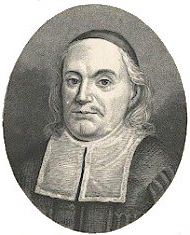
"Ich hab in Gottes Herz und Sinn" is a Christian hymn with a text by Paul Gerhardt in twelve stanzas is sung to the melody of "Was mein Gott will, das g'scheh allzeit". The theme of the hymn is faith in God and the submission to his will.
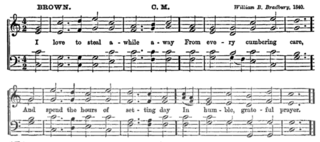
"I love to steal awhile away" is a Christian hymn written by Phoebe Hinsdale Brown in 1818 in New Haven, Connecticut, U.S. It was Brown's habit to retire some distance from her house every day at a certain hour for meditation and prayer. The well-beaten path to the woods was discovered, and she was ridiculed by a thoughtless neighbor. "I love to steal awhile away" was written that night in tears, and later sung wherever the English language is spoken. The original version of the poem referenced Brown's domestic cares, but these were removed by the Rev. Asahel Nettleton in the published hymn.
Elizabeth Scott Williams Smith was an 18th-century British-born American poet and hymnwriter. Prior to 1750, she wrote many hymns with the largest of her known manuscript collections containing 90 of these. The first publication of her hymns was in The Christian's Magazine, edited by William Dodd, 1763. Nineteen of her hymns were given in John Ash and Caleb Evans' baptist Collection, Bristol, 1769, and twenty in John Dobell's New Selection, 1806. Of these, one of the best known is "All hail, Incarnate God". Smith died in 1776.

Dorothy Ann Thrupp was a British psalmist, hymnwriter, and translator. Many of her psalms and hymns, which were published under various pseudonyms, were included in: Friendly Visitor ; Children's Friend ; Selection of Hymns and Poetry for the Use of Infant Schools and Nurseries ; Hymns for the Young ; and Thoughts for the Day. Thrupp was the author of Thoughts for the Day that was published in 1837, and Songs by the Way. In addition to these, her hymns were published in magazines edited by Caroline Fry. Thrupp is particularly remembered as a writer of hymns for children. "Savior, Like a Shepherd Lead us" first appeared unsigned in her collection Hymns for the Young, in 1836, with music by William B. Bradbury. Her most popular hymn was for children and it was titled A Little Ship on the Sea. Thrupp died in 1847.
A. Flowerdew was an English teacher, religious poet and hymnist. Her main work was Poems on Moral and Religious Subjects (1867). She died in 1830.

"Ye Choirs of New Jerusalem" or "Sing, Choirs of New Jerusalem" is an English Easter hymn by Robert Campbell. It is a 19th-century translation of the medieval Chorus novae Ierusalem, attributed to Fulbert of Chartres. The text's primary focus is the Resurrection of Jesus, taking the theme of Jesus as triumphant victor over death and deliverer of the prisoners from Hell.

"Christians, awake, salute the happy morn" is an English Christmas hymn on a text by John Byrom. It is usually sung to the tune "Yorkshire" by John Wainright.
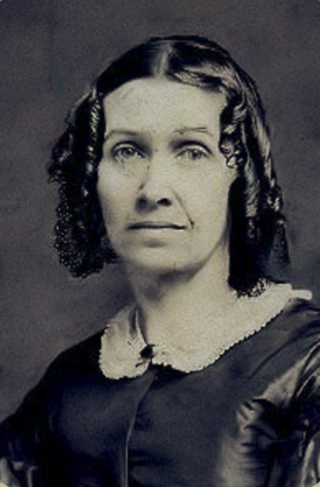
Maria Frances Anderson was a 19th-century French-born American writer of prose and hymns. Her hymn, "Our country's voice is pleading", written in 1848, and published the following year in The Baptist Harp, came into common use.















